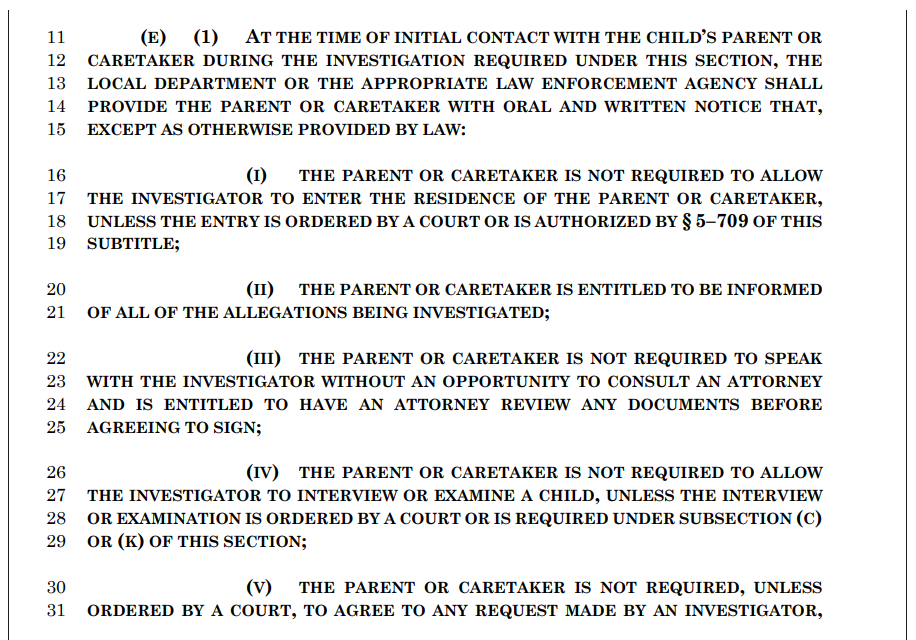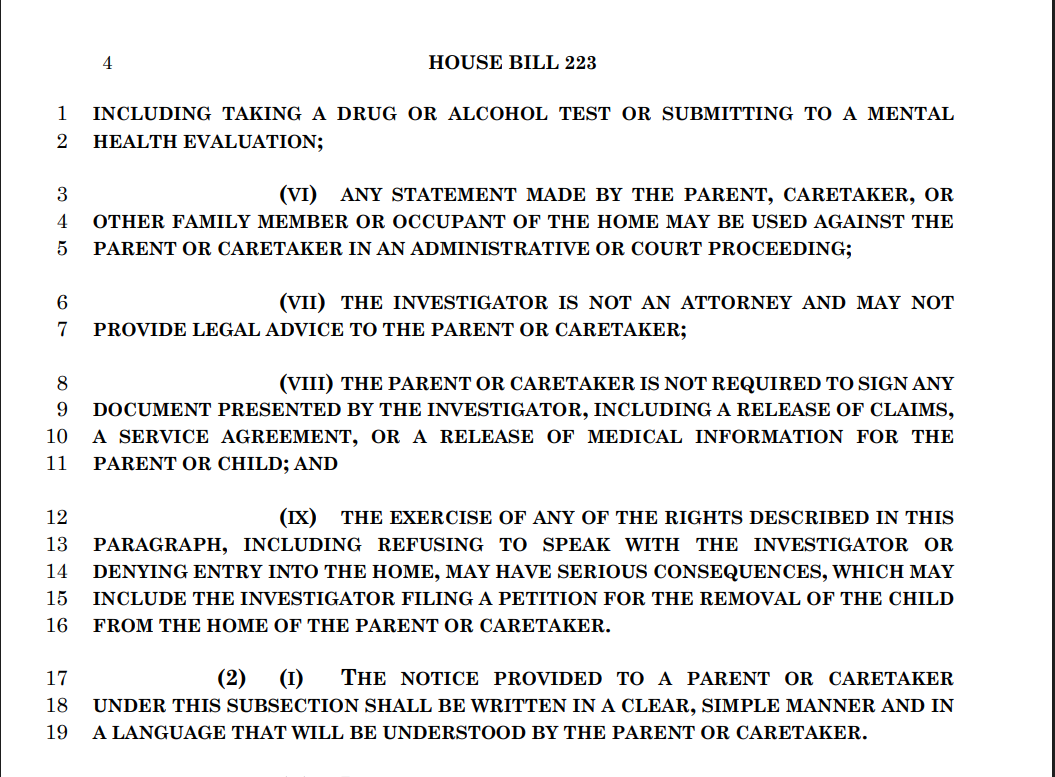Maryland “Know Before They Knock” Family Right to Notice Act dies
In 2025, the Maryland legislature introduced HB 223, which would have guaranteed that parents and caretakers subject to abuse/neglect investigations receive oral and written notice of their rights in plain language upon initial contact with either the local social services department or law enforcement. The House Judiciary Committee held a hearing on HB 223 on February 13, but the bill never made it out of Committee, despite the fact that numerous people appeared both in-person and virtually to support of the bill. Proponents noted that rampant due process violations lead to unnecessary separations that harm and traumatize children, families, and communities alike. They also highlighted the fact that the law would simply codify practices that the social services department should already be engaging in and that adhering to such practices would build trust between the department and communities, as well as help streamline Child in Need of Services (CINA) cases.
The bill’s Fiscal and Policy Note had estimated that the bill would require general fund expenditures in excess of $1 million annually. In reaching its conclusion about estimated expenditures, the Department of Legislative Services appears to have relied, at least in-part, on statements made by the DHS:
The Department of Human Services (DHS) advises that while the bill does not grant new rights for caretakers, it requires DHS to frame preexisting rights in a manner resembling Miranda rights. It estimates, as a result, more families will be less inclined to cooperate with DHS in investigations of child maltreatment.
As to the requisite notice required to be given to parents and caretakers, HB 223 provides:


Less cooperation, DHS reasoned, would likely result in increased court-involved investigations and CINA petitions, leading to the need to hire at least 42 personnel, including an estimated 30 additional attorneys. DHS also cited “costs associated with printing the required notices and annual staff training.” However, one of the bill’s proponents, Kenneth Wardlaw, Supervising Attorney for the Office of the Public Defender (OPD) Parental Defense Division, noted in his testimony to the Committee that “HB 223 would simply codify what is already expected from a worker from the Department of Social Services regarding providing information to the parents of their rights at the time of the investigation by DSS. These rights are already protected by the Constitution as well as other laws and regulations…” The Note’s State Expenditure Analysis concluded by conceding, “The Department of Legislative Services, while generally acknowledging that the legislation may result in increased court involvement for maltreatment investigations … , advises that, without experience under the bill, it is unable to independently verify the extent to which additional staff – particularly at the magnitude of that estimated by DHS – are required.”
The Note did not incorporate any advisement from the OPD in its Expenditure Analysis, despite the fact that the OPD is the entity tasked with representing parents in CINA matters under Md. Code Ann., Crim. Pro. § 16-204. However, Nena Villamar, Chief of the OPD Parental Defense Division, did testify at the hearing in support of the bill as did other OPD staff. Villamar’s testimony underscored the importance of the legislation and appeared to respond directly to DHS concerns:
HB 223 is simple, and it does the same thing in CINA cases that Miranda Rights have done in criminal cases for more than 50 years: It ensures that parents are informed of the rights that Maryland law already grants them. Basic rights, like the right to know the allegations that they’re being investigated for, the right to speak with an attorney before signing a binding document, the right not to have a government agent enter and search their home without a consent or court order. But these rights only matter if parents know them…
I want to be clear. HB 223 does not weaken child protection laws. If a child is in immediate danger, DHS and law enforcement already have the power to enter a home and remove a child. This bill does not change that. But most importantly, when parents understand their rights, they’re more likely to trust the process, cooperate, and work with DHS, which ultimately benefits children and communities… [A]s the U.S. Supreme Court has made clear, justice cannot be built on secrecy and coercion. Keeping parents in the dark when they stand to lose their children is not how Maryland should protect families.
(emphasis added). Wardlaw’s sentiments also echoed Villamar’s, noting the role of due process violations in undermining investigations: “Currently, the threats by the investigators to remove the parents’ children if they do not instantly comply with the investigation, providing immediate answers to their questions, allowing uninvited access tot he family home, and unfettered access to the children only serves to complicate the department’s investigation of the matter…” Natasha Khalfani, Managing Attorney of the OPD Pre-Petition Early Advocacy Program and who has represented both parents and children in CINA matters, spoke about devastating due process violations she’s witnessed the Department of Social Services (DSS) commit:
Social workers have illegally asked hospitals to hold a child while they find a reason to take the child from the parent. We were contacted by the hospital to intervene. DSS has repeatedly forced parents to send their children to family or friends and then refused to assist them in retrieving the child when the investigation is over and no abuse was found. DSS takes substance exposed newborns from their parents who are successfully in treatment, though the law says they shouldn’t. And DHS consistently threatens foster care when parents ask questions regarding process and safety… For these reasons, I’m asking for a favorable report on HB 223.
Bay Golfin, Supervising Attorney with Maryland Legal Aid who represents children in CINA matters added:
As my colleagues have said, the main purpose of this bill is to put parents on notice of rights that they already have. However, many — including our clients — are currently too scared to do anything but comply. One client told me, ‘When you hear “CPS,” you hear that someone is coming to take your children. It’s like what people say when police hold them at gunpoint. I just did whatever they said, because I didn’t want my baby to end up in foster care.’ … The vast majority of investigations initiated by the department are closed without a finding of maltreatment. But I’m here to tell you that that does not mean that these investigations are being closed without causing real harm. …
Multiple parents also testified in support of the bill, detailing the trauma, fear, and confusion they and their children endured while interacting with child protective services, as well as ongoing family separation such as that faced by Melissa Wisniewski, a parent who was pressured into signing a safety plan that she never received a copy of. See hearing at 15:25. Wisniewski testified that although the 2022 case against her was ultimately closed and no determination was ever made that her child had been in imminent danger, her daughter remains removed from the home eight months later:
The grief of losing her is unbearable. No mother should have to endure this pain. My family carries the scars of that day, a day that could have gone differently, if only I had been informed of my rights. I wish I had known that I had the right to speak with an attorney, the right to refuse to sign documents I didn’t understand, and the right to challenge their decision before my child was taken. If I had known my rights, I could have fought for my daughter that night. I share my story so no other parent must experience this nightmare. Knowing your rights can change everything.
Although a pre-petition right to counsel is rare, it is gaining attention as a best practice. The Barton Child Law and Policy Center hosts a Preventive Legal Advocacy & Pre-Petition National Cohort, which has monthly meetings.
Referred to as the “Know Before They Knock Family Rights to Notice Act,” HB 223 was sponsored by Delegate Crutchfield who introduced comparable legislation in 2024. See HB 644, the “Caretaker Bill of Rights”). The fiscal note for HB 644 reached similar conclusions about increased expenditures. The state of Oregon also introduced legislation in 2025 designed to inform parents of their rights at the time an investigation is initiated. See Oregon SB 736 and HB 2999.
Bill Status: Dead
Last action (on 04/07/2025): House Judiciary Committee hearing on 2/13/25 at 1:00 p.m.



